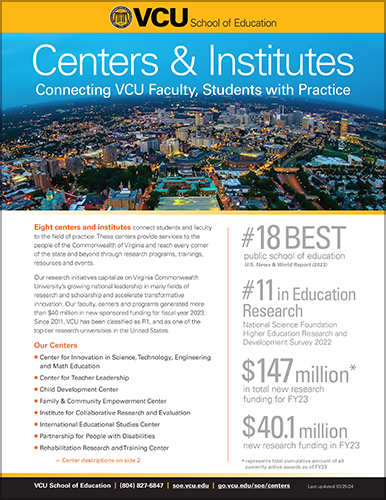Centers & Institutes

At the VCU School of Education, our work doesn't stop at the classroom door.
Our eight affiliated centers and institutes serve as our arms out into the community, putting the research and learning being done in our programs and departments to use where it's needed most: right here in the city of Richmond.
From helping individuals with disabilities find work to creating city-wide sporting events, these groups provide opportunities for you to expand your education in ways you won't find at other schools.
Center for Innovation in STEM Education
Dedicated to cultivating a lifelong passion for Science, Technology, Engineering and Mathematics (STEM) among K-12 students in Central Virginia, CISTEME fosters a deep-seated passion for these subjects. Beyond building careers, its mission is constructing a brighter, more equitable world where opportunities are boundless and dreams are within reach.
Center for Teacher Leadership (CTL)
By advancing the concept of teachers as change agents, the CTL promotes and supports teacher leadership to improve teaching and learning. CTL’s high-quality training develops passionate, influential leaders, and promotes the sharing of teachers’ knowledge, experience and insight with policymakers and other stakeholders.
Visit website

Child Development Center (CDC)
With more than 100 years of history, the CDC is a full-day, inclusive young children’s program that provides high-quality care and education. CDC serves as a learning lab for student preservice experiences, faculty research, and community outreach and education.
Visit website
Family & Community Empowerment Center (FCEC)
Launched in 2023, the FCEC brings together scholars from many backgrounds with the goal to empower community members, particularly individuals who have been historically marginalized, through collaborative action and mental health support. The FCEC provides services and programming, including counseling, with the goal to develop well-being and peace of mind with individuals, families, and communities.
Visit website
Institute for Collaborative Research and Evaluation (ICRE)
ICRE improves outcomes for individuals, organizations and communities through its comprehensive research and evaluation services. ICRE’s unique approach combines rigorous methodologies with collaborative stakeholder engagement, leading projects that address critical issues in education and community development. Projects span areas such as teacher residency models, career pathways, student mental health and more, many with national funding from the National Science Foundation and the U.S. Department of Education.
Visit website
International Educational Studies Center (IESC)
The IESC provides various educational and cultural opportunities for scholars, educators and students worldwide to explore foundational and culturally meaningful topics in education and related fields. The IESC strives for an educational community that encourages dynamic intellectual dialogues among all stakeholders responsible for educating individuals from every background.
Visit website
Metropolitan Educational Research Consortium
Established in 1991 as a partnership between Richmond-area school divisions and Virginia Commonwealth University’s School of Education, MERC leads research that addresses enduring and emerging issues in PK12 education with the goal of informing policy, building the professional knowledge and skills of key stakeholders, contributing to the body of scholarly knowledge, and ultimately impacting outcomes relevant to students, schools, and communities.
Visit website
Partnership for People with Disabilities (PPD)
The PPD is Virginia’s federally-designated University Center for Excellence in Intellectual and Developmental Disabilities. Operating 48 projects across various domains – including community living, early intervention, education and health – PPD empowers individuals with disabilities and their families to lead self-determined lives.
Visit website
Rehabilitation Research and Training Center (RRTC)
The RRTC focuses on transition and employment for persons with disabilities. Through its research, training and technical assistance, direct service, and dissemination activities, RRTC profoundly influences policy, practice and outcomes at both state and national levels.
Visit website